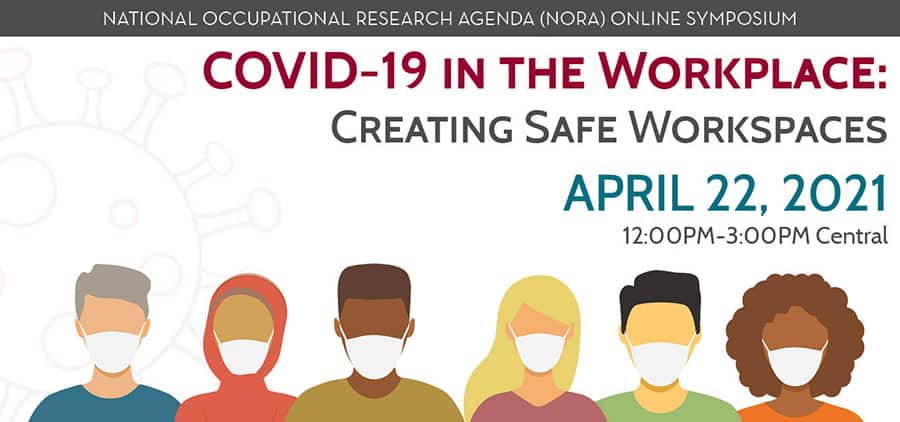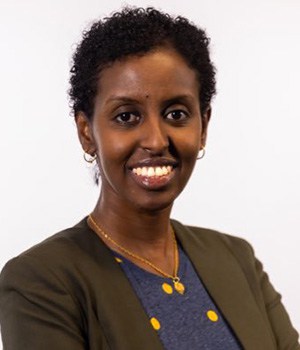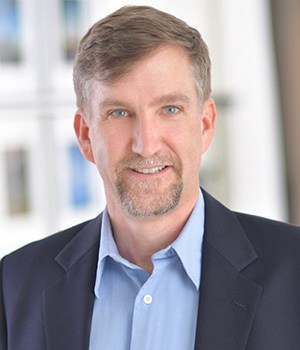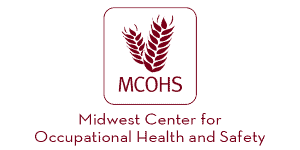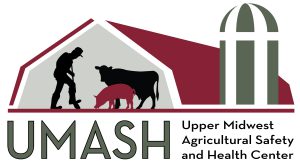2021 NORA Online Symposium
April 22, 2021
The 2021 National Occupational Research Agenda (NORA) Online Symposium was held via online webinar on April 22, 2021. The theme was “COVID-19 in the Workplace: Creating Safe Workspaces.” The keynote for this year’s symposium was Dr. Michael Osterholm, Director of the Center for Infectious Disease Research and Policy (CIDRAP). Once again, the symposium was co-sponsored by the Midwest Center for Occupational Health and Safety (MCOHS) Education and Research Center and the Upper Midwest Agricultural Safety and Health Center (UMASH).
Though the ongoing pandemic has caused us to shift our practices and perspective, moving to the online format proved beneficial. Nearly 500 participants joined the webinar from around the world, making it the largest and most diverse NORA attendance to date. Live-tweeting of highlights and key points during the event reached an even larger audience, as MCOHS and UMASH posted the live social media updates.
WATCH THE RECORDED
2021 NORA SYMPOSIUM
The entire 2021 NORA Symposium is available as a YouTube playlist, with individual videos for each poster presentation, Dr. Osterholm’s keynote talk, and the panel presentation.
EVENT SUMMARY
VIRTUAL POSTER PRESENTATIONS
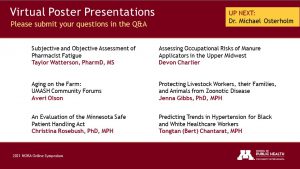 The symposium began with a virtual poster session. Students and partners from MCOHS and UMASH provided short video presentations on a variety of occupational health and safety research projects and topics. Following the videos, the presenters engaged with attendees in a live Q&A session, facilitated by Dr. Susan Arnold. This interactive exchange led to further discussion on the individual projects, as well as ideas for ongoing and future research.
The symposium began with a virtual poster session. Students and partners from MCOHS and UMASH provided short video presentations on a variety of occupational health and safety research projects and topics. Following the videos, the presenters engaged with attendees in a live Q&A session, facilitated by Dr. Susan Arnold. This interactive exchange led to further discussion on the individual projects, as well as ideas for ongoing and future research.
- Subjective and Objective Assessment of Pharmacist Fatigue
Taylor Watterson, PharmD, MS
Advisor: Michelle A. Chui, PharmD, PhD
University of Wisconsin-Madison School of Pharmacy
MCOHS Pilot Project
- Aging on the Farm: UMASH Community Forums
Averi Olson, Occupational Therapy Student
Advisors: Cindy Anderson, OTD, OTR/L; Jeff Bender, DVM, MS
University of Mary
UMASH
- An Evaluation of the Minnesota Safe Patient Handling Act
Christina Rosebush, PhD, MPH
Advisors: Patricia McGovern, PhD; Katherine Schofield, PhD
Division of Environmental Health Sciences, University of Minnesota
MCOHS Pilot Project
- Assessing Occupational Risks of Manure Applicators in the Upper Midwest
Devon Charlier, Masters of Public Health Student
Collaborators: Melissa Wilson, PhD; Chryseis Modderman, MS; Erin Cortus, PhD; Jeff Bender, DVM, MS; Kevin Janni, PhD
University of Minnesota
UMASH
- Protecting Livestock Workers, their Families, and Animals from Zoonotic Disease
Jenna Gibbs, PhD, MPH
Ag Health and Safety Alliance
UMASH
- Predicting Trends in Hypertension for Black and White Healthcare Workers
Tongtan (Bert) Chantarat, MPH
Advisors: Eva A. Enns, PhD; Rachel R. Hardeman, PhD; Patricia McGovern, PhD
Division of Health Policy and Management, University of Minnesota
MCOHS Pilot Project
KEYNOTE PRESENTATION
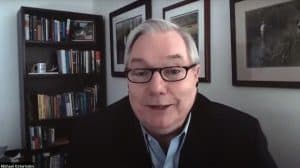 Following the virtual poster session, UMASH Director, Dr. Jeff Bender, joined Dr. Osterholm for a “fireside chat” style keynote presentation. In his talk, Dr. Osterholm addressed the current state and latest developments of the global COVID-19 pandemic; the emergence of variants, increased spread in other countries around the globe, ongoing health and safety efforts, occupational risks, and the advancements and challenges surrounding vaccination, including efficacy, hesitancy, and equitable access and distribution.
Following the virtual poster session, UMASH Director, Dr. Jeff Bender, joined Dr. Osterholm for a “fireside chat” style keynote presentation. In his talk, Dr. Osterholm addressed the current state and latest developments of the global COVID-19 pandemic; the emergence of variants, increased spread in other countries around the globe, ongoing health and safety efforts, occupational risks, and the advancements and challenges surrounding vaccination, including efficacy, hesitancy, and equitable access and distribution.
Following Dr. Osterholm’s talk, Dr. Bender moderated an interactive Q&A session, during which participants submitted questions for Dr. Osterholm. The response from attendees was overwhelming as questions flooded in. Though time did not allow for all questions to be answered, the level of participation was encouraging, and Drs. Bender and Osterholm addressed a variety of concerns surrounding COVID-19 and workplace safety.
PANEL PRESENTATION
The symposium was capped off with a panel presentation by experts representing healthcare, agriculture, retail, and community engagement organizations. Following the presentations, Dr. Marizen Ramirez, MCOHS Director, moderated a live Q&A discussion with the panelists and attendees. During this discussion, Dr. Ramirez shared questions from the participants with the panelists, addressing the relevant challenges in each industry or area of expertise, and incorporating the panelists’ unique perspective and experiences.
The panelists were:
MCOHS and UMASH were proud to once again co-sponsor this annual event.
We wish to thank the presenters, as well as the faculty and staff who work together each year to make it happen, even in challenging times! We look forward to future symposia as we continue the engaging and vital discussions on occupational health and safety.
The NORA Symposium was co-sponsored by the Midwest Center for Occupational Health and Safety Education and Research Center (MCOHS) and the Upper Midwest Agricultural Safety and Health Center (UMASH).

